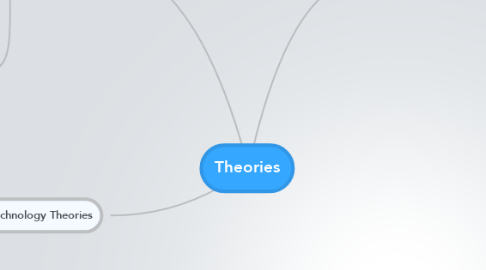
1. Technology Theories
1.1. Media Ecology
1.1.1. Theorists: Postman and McLuhan
1.1.2. Technology influences society
1.1.3. "the study of media environments, the idea that technology and techniques, modes of information and codes of communication play a leading role in human affairs." Media Ecology Association
1.2. SCOT
1.2.1. Social Construct of Technology
1.2.1.1. Theorists: Bijker and Pinch
1.2.1.2. Society and human action influence technology
1.2.1.3. Symmetry, closure, Bycicle.
2. TPACK
2.1. This is a framework to help decide the best use of technology and how to teach certain content with technology.
2.2. There are three types of knowledge
2.2.1. Pedagogy
2.2.1.1. This involves the idea of how to teach
2.2.2. Content
2.2.2.1. This is what you are teaching
2.2.3. Technology
2.2.3.1. This is what you are using to teach the content
2.3. http://www.tpack.org/
3. Learning Theories
3.1. Behaviorism
3.1.1. Theorists: Pavlov, Watson, Thorndike, Skinner
3.1.2. Environmental stimulus causes learning to occur
3.1.3. Key ideas: "practice makes perfect"- operant conditioning, punishment, consequence, shaping, cuing, modelling, intructivism.
3.1.4. In Education: Learner outcomes, lectures, classroom management, etc...
3.1.5. Examples of technology: Math Blaster, iClicker, CAI and CAA, microquest games, etc...
3.1.6. Criticisms: Oversimplifies learning, always ties learning to behavior, learning doesn't require rewards/punishment, the mind is not a blank slate and people adapt.
3.2. Cognitivism
3.2.1. Theorists: Piaget, Gagne, Vygotsky, Bruner
3.2.2. goes beyong "blank slate" with active memory systems that organize/process information.
3.2.3. prior knowledge is important.
3.2.4. Schemas and Scaffolding
3.2.5. Sensory, Short-term, Working, and Long-term memory.
3.2.6. Key Ideas: Seriality, mental maps, organization, practice and retention, mneumonic (memory) devices, meanigful effect, motivation, metaphor.
3.2.7. cognitive load theory: processing information can over or under load working memory.
3.2.8. In Education: What things look like and how they are organized matters.
3.2.9. Technologies: Digital concept maps, prezi, databases, etc...
3.2.10. Criticisms: Ignores affective and psychomotor and too focused on knowledge.
3.3. Constructivism
3.3.1. mind is a rhizone (network).
3.3.2. learning is building connections by active interactions. It begins with complex problems and teaches basic skills while solving. Involves contructing one's own knowledge from one's own experiences.
3.3.3. Key ideas: Teacher as facilitator, problem, project, case, collaborative, active and discovery learning, and authentic tasks.
3.3.4. Technologies: Lego robotics, scratch, video games, webquests, etc...
3.3.5. criticisms: Time consuming, subjective learning, mature learners only, difficult to assess and impractical without prior knowledge.
3.4. And sometimes Connectivism
3.4.1. Theorists: Siemons and Downes
3.4.2. learning is creating connections and networks
3.4.3. ``forget trying to know everything; instead build your network of knowledge sources and access them whenever you need them.`` Ryan Tracey
3.4.4. Key Ideas: Current, diversity of opinions, process of connecting, connections, connections, connections.
3.4.5. Technologies: Social networking, RSS, search engines, etc...
3.4.6. Citicisms: Informal vs. Formal learning, is it a new theory?, socialization not a goal of education, groups are not networks.
